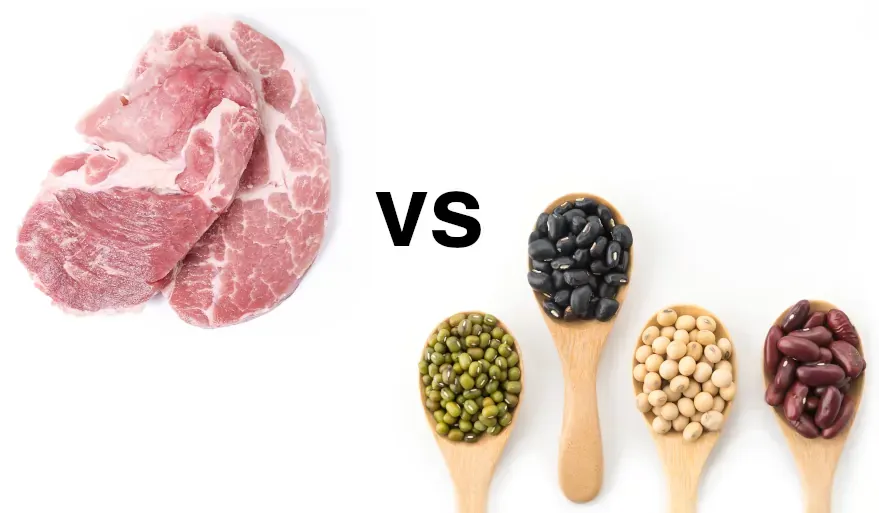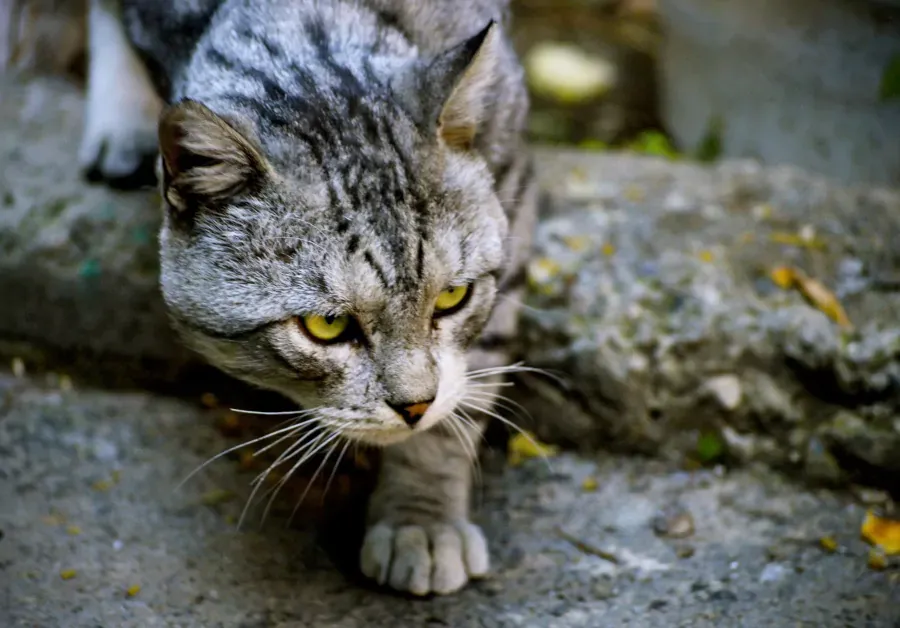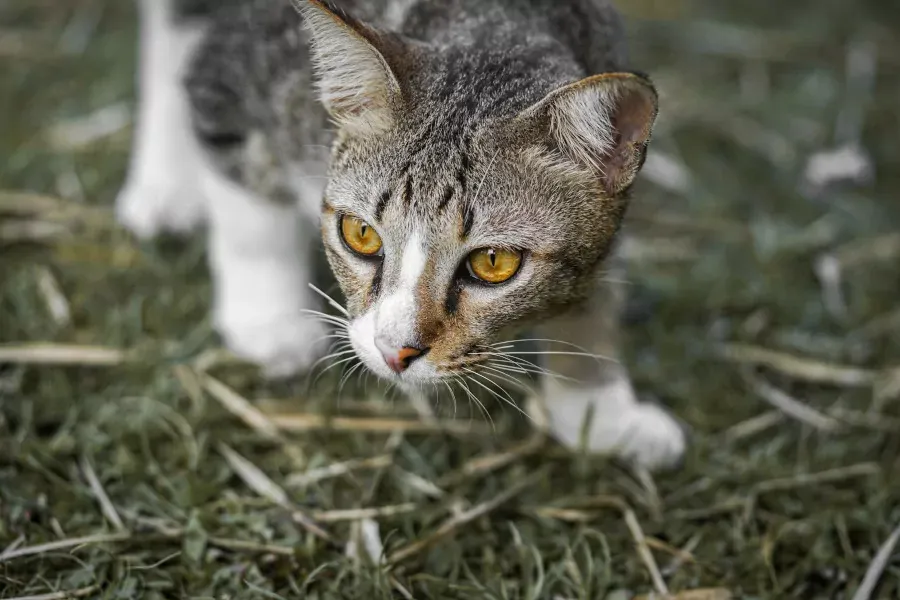The Importance of Animal versus Plant Proteins for Cats
As true carnivores, cats are unable to effectively utilise plant proteins. They are less digestible, incomplete and unsuitable to felines. They are also less bioavailable and less nutritionally supportive. Cats need animal-based protein – and lots of it – to maintain health and optimal functioning.

House cats, like all other felines on the planet, are carnivores. However, they differ from most other carnivores in that they are strict meat eaters.
Cats are known as obligate, hyper or super carnivores, while others term them true carnivores 1. The obligate class of carnivores rely solely on the tissues of prey animals to fill every nutritional need.
The cat's high performance physiology evolved entirely around this fuel source. Feeding them plant proteins is akin to putting the wrong fuel in your car's tank.
It may go for a while, but it will sustain irreparable engine damage.
...the cat’s protein requirement
Cats have a higher than usual protein requirement compared to most other carnivores 1. In fact, it’s one of the cat’s distinguishing features. And it is part of what makes them such incredible and unique creatures.
Cats can cope with a lot of protein. They are able to effectively metabolise more than double their daily requirement 2.
...why such a high requirement?
Protein is the primary macronutrient responsible for the maintenance of muscle mass. As predators, cats are lightning fast, sleek, muscle machines. Whether they hunt or not, their protein requirement is written in their genes.

To sustain them and maintain their high performance bodies, they need high volumes of protein throughout their lives – not only during their growing years.
In fact, a cat’s protein requirement reaches a peak once they are fully grown – to enable effective body maintenance 1. Protein and amino acids are also necessary to meet the high brain-glucose demands of carnivores 3.
And, animal-based protein provides the carbon chains needed to produce this glucose 4. How cool is that?
...high nitrogen losses
The cat’s high protein demand, in large part, comes from the very active nitrogen catabolic enzymes in their liver 1. And these enzymes are non-adaptive.
This means that they are unable to be effectively down-regulated when protein intake is insufficient. In most mammals, when there is a reduction in protein in the diet, nitrogen is conserved and recycled for amino acid synthesis 5.
...no brakes on nitrogen loss
In cats, there is no nitrogen sparing mechanism when protein intake is lowered. The inability to switch off these enzymes is demonstrated by the high levels of nitrogen in the cat's urine, even during periods of no food intake 2.
Cats need protein dense food to offset these continual losses.
...destructive metabolism
For felines, failed hunts and short bouts of starvation are common realities. Their unusually high protein diet allows for better blood-glucose control during fasting, through a process called gluconeogenesis 5.
And they can achieve blood-glucose regulation to a degree that few other species can. But for this they need good quality animal protein. Or else this cool metabolic feature will start to turn on them.
Continued inadequate protein intake will cause serious malnutrition and muscle wasting 6. Cats will literally start to self-cannibalise and use their own muscles to support their biological processes.
...not any old protein will do
As a rule, animal-based protein is better suited to the cat’s digestive system and biology. Cats have fully adapted to get every nutrient they need from prey animal tissues.
Because of this, the cat's body has deleted the pathways to produce certain nutrients, as they have become redundant 1.
This is a clear example of nature's 'use it or lose it' principle of evolution. Because of these deletions, no food source – other than animal tissues – can fully support them.
...cats need preformed nutrients
To give one example, there are 10 specific amino acids in animal tissues – referred to as essential amino acids – that cats cannot produce in their bodies 4. And proteins and amino acids are really the building blocks of life 7.
Sufficient intake of animal protein is crucial for cats to obtain these amino acid building blocks. These are then used for the production of important biologically active compounds, and to perform bodily processes 4.

...high octane fuel – for felines
Animal-based protein provides the complete essential amino acid profile, in perfect balance and in an active, ready to use form. As already alluded to, it also contains every single nutrient cats require.
Plant proteins lack many of these indispensable nutrients 8. With feline inappropriate plant-based proteins, cats will quickly run into all sorts of nutritional problems.
...glutamic acid in just the right amount
Cats have an innate sensitivity to glutamic acid 4. In the correct amount, this amino acid enables nerve cells in the brain to communicate with other cells 9.
It may also be involved in learning and memory, which makes it pretty important. However, in excess it has an excitotoxic effect on the cat's brain and can damage or even kill healthy cells 10.
Animal protein provides this crucial amino acid in the perfect amount to fully support the cat's very active brain without causing damage.
...plant proteins simply do not make the grade
Plant-based proteins lack the nutritional complexity and the complete amino acid and nutrient profile of animal protein 8. For many mammals – and also humans – this is not a problem.
Our bodies can produce many of the missing building blocks. However, as already explained, the cat's body has deleted these capabilities.
...plant proteins are damaging to carnivores
Owed to the high carbohydrate content of most plant proteins, the cat's high performance metabolic systems become damaged. They also lose their remarkable blood-glucose regulatory abilities.
Even short periods of fasting can now cause detrimental liver damage and even death 8. This is especially true for obese and overweight cats as well as those on carbohydrate rich commercial diets 11.
...excessive glutamic acid in plant proteins
Unlike animal protein, plant-based proteins do not provide cats with the right amount of glutamic acid in relation to other nutrients.
Even though cats have a high tolerance for excess crude protein and certain amino acids, glutamic acid is not tolerated well 1. Most plant proteins contain double the glutamic acid of animal-based proteins.
On plant sources of protein, cats can quickly reach intolerable levels of glutamic acid, even before the correct protein and amino acid thresholds are reached.
...poor nutritional support for cats
No matter how you slice it, plant-based proteins do not have the same biological value to cats than animal-based ones 8. Plant-based proteins are highly processed and they fall short in many ways.
They have to be supplemented, which requires the use of synthetic nutrients. These nutrients are made from chemical compounds that are produced in laboratories 12.
As synthetic substances, they are incomparable to live nutrients in real, fresh, unprocessed foods 13.
A future resource for subscribers promises to focus on the ways synthetic nutrients fall short and the many drawbacks they pose to cats.


References
1 MacDonald, M.L., Rogers, Q.R. & Morris, J.G. (1984). Nutrition of the domestic cat, a mammalian carnivore. Annual Review of Nutrition, 4, 521 – 562.
2 (2002). Up-regulation of nitrogen catabolic enzymes is not required to readily oxidize excess protein in cats [Letter to the editor]. The Journal of Nutrition, 132(9), 2819–2820.
3 Wester, T.J., Weidgraaf, K., Hekman, M., Ugarte, C.E., Forsyth, S.F. & Tavendale, M.H. (2015). Amino acid oxidation increases with dietary rotein content in adult neutered male cats as measured using [1-13 C] Leucine and [15 N2] urea 1-3. The Journal of Nutrition, 145(11), 2471 – 2478; doi:10.3945/jn.115.216275.
4 The National Research Council [NRC] (2006). Your cat's nutritional needs: A science-based guide for pet owners. The National Academy of Science. Retrieved March 20, 2015, from http://dels.nas.edu/resources/static-ssets/materials- based-on-reports/booklets/cat_nutrition_final.pdf
5 Morris, J.G. (2002). Idiosyncratic nutrient requirements of cats appear to be diet-induced evolutionary adaptations. Nutrition Research Reviews, 15, 153 – 168.
6 Food Fur Life. (n.d.). What does it mean the cat is an obligate carnivore? Retrieved April 20, 2023, from https://www.foodfurlife.com/what-does-it-mean-the-cat-is-an-obligate-carnivore.html#/
7 Medline Plus (n.d.). Amino acids. Retrieved April 20, 2023, from https://medlineplus.gov/ency/article/002222.htm
8 Pierson, L.A. (n.d.). Cats need animal-based protein. In Catinfo.org. Retrieved April 20, 2023, from https://catinfo.org/#Cats_Need_Animal-Based_Protein
9 University of Rochester Medical Center (n.d.). Glutamic acid. Retrieved April 18, 2023, from https://www.urmc.rochester.edu/encyclopedia/content.aspx?contenttypeid=19&contentid=GlutamicAcid
10 Cleveland Clinic (2022). Glutamate. Retrieved April 19, 2023, from https://my.clevelandclinic.org/health/articles/22839-glutamate
11 Hofve, J. (2022). 10 Reasons why dry food is bad for cats & dogs. In Little Big Cat. Retrieved on April 20, 2023, from https://littlebigcat.com/why-dry-food-is-bad-for-cats-and-dogs/#
12 Aurora Medical Centre (2022). Organic vs synthetic vitamin supplements, which one is better? Retrieved April 19, 2023, from https://www.auroramedicalcentre.com.au/post/organic-vs-synthetic-vitamin-supplements-which-one-is-better
13 Clement, B.R. (2010). Supplements Exposed: The truth they don't want you to know about vitamins, minerals, and their effects on your health. Franklin Lakes, New Jersey: New Page Books.
Disclaimer
The information provided on the Bestfedcats.com website is educational and informational. We are here to give guidance on how to feed a properly balanced raw diet. We also offer advice on how to improve the diet of the modern house cat. Please note that we are not veterinarians. We are not here to give veterinary advice. Best Fed Cats will not be held responsible for any adverse reactions to your cat based on the information on our website. The health of your cat depends entirely on you. We expect you to use your knowledge of your cats, their circumstances and their health – in conjunction with a trusted veterinarian – to determine if any advice provided on this site is appropriate for your cats.

